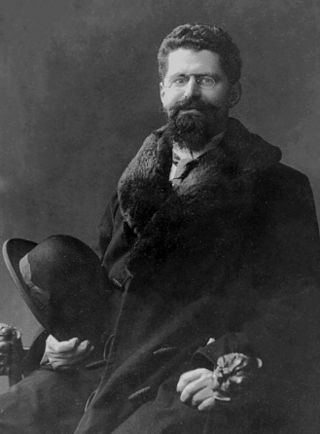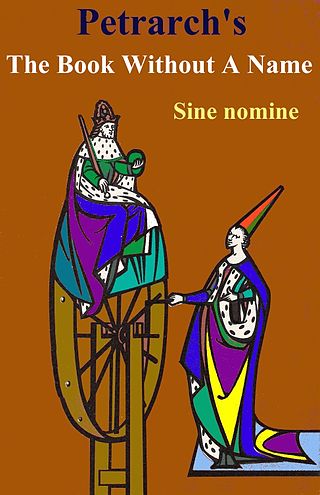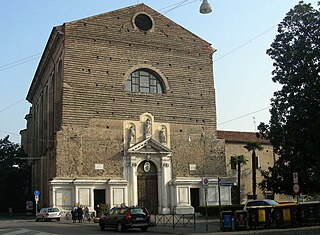
Francesco Petrarca, commonly anglicized as Petrarch, was a scholar and poet of early Renaissance Italy, and one of the earliest humanists.

Antiqua is a style of typeface used to mimic styles of handwriting or calligraphy common during the 15th and 16th centuries. Letters are designed to flow and strokes connect together in a continuous fashion; in this way it is often contrasted with Fraktur-style typefaces where the individual strokes are broken apart. The two typefaces were used alongside each other in the germanophone world, with the Antiqua–Fraktur dispute often dividing along ideological or political lines. After the mid-20th century, Fraktur fell out of favor and Antiqua-based typefaces became the official standard.
The Top10, known as the Peroni Top10 for sponsorship reasons, and formerly Top 12, is Italy's top level professional men's rugby union competition. The Top 10 is run by Federazione Italiana Rugby (FIR) and is contested by 10 teams as of the 2019–2020 season, following the Italian federation's decision to name Peroni as the official partner of the Top10 competition.

Francesco Severi was an Italian mathematician. He was the chair of the committee on Fields Medal on 1936, at the first delivery.

Francesco de Sanctis was a leading Italian literary critic and scholar of Italian language and literature during the 19th century.

Arquà Petrarca is a town and municipality (comune) in northeastern Italy, in the Veneto region, in the province of Padua. As of 2007 the estimated population of Arquà Petrarca was 1,835. The town is part of the association of the most beautiful villages in Italy, and it has been awarded the Bandiera arancione award for excellence in tourism, hospitality and the environment.

The House of Carrara or Carraresi (da Carrara) was an important family of northern Italy in the 12th to 15th centuries. The family held the title of Lords of Padua from 1318 to 1405.

De viris illustribus is an unfinished collection of biographies, written in Latin, by the 14th century Italian author Francesco Petrarca. These biographies are a set of Lives similar in idea to Plutarch's Parallel Lives. The works were unfinished. However he was famous enough for these and other works to receive two invitations to be crowned poet laureate. He received these invitations on exactly the same day, April 8, 1341, one being from the Paris University and the other from the Roman Senate. He accepted the Roman invitation.

The Liber sine nomine is a collection of nineteen personal letters written in Latin by the fourteenth century Italian poet and Renaissance humanist Petrarch. The letters being harshly critical of the Avignon papacy, they were withheld from the larger collection of his Epistolae familiares and assembled in a separate book. In this fashion, Petrarch reasoned, a reader could throw away this collection, and the other letters to friends could be preserved for posterity.
Francescuolo da Brossano was the son-in-law and heir of the Italian medieval poet Petrarch.

Fontaine-de-Vaucluse is a commune in the southeastern French department of Vaucluse. In 2018, it had a population of 585. Its name comes from the spring of the same name; the name Vaucluse itself comes from the Latin phrase vallis clausa or "closed valley".

Francesco I da Carrara, called il Vecchio, was Lord of Padua from 1350 to 1388.

Petrarca-Preis was a European literary and translation award named after the Italian Renaissance poet Francesco Petrarca or Petrarch. Founded in 1975 by German art historian and publisher Hubert Burda, it was primarily designed for contemporary European poets, but some occasional non-Europeans appear in the list of laureates.

Francesco Laparelli da Cortona was an Italian architect. He was an assistant of Michelangelo, and later was sent by the Pope to supervise the construction of Valletta in Malta.
Atilius Fortunatianus was a Latin grammarian. He was the author of a treatise on metres, dedicated to one of his pupils, a youth of senatorial rank, who desired to be instructed in the Horatian metres. The manual opens with a discussion of the fundamental ideas of metre and the chief rules of prosody, and ends with a detailed analysis of the metres of Horace. The chief authorities used are Caesius Bassus and the Latin adaptation by Juba the grammarian of the Τέχνη of Heliodorus. Fortunatianus being a common name in the African provinces, it is probable that the author was a countryman of Juba, Terentianus Maurus and Victorinus.

Saint Ambrose is a small church which is an annex to the farmhouse that takes its name from it, in Brugherio, Italy.
The Palazzo Mussato is an 18th-century palace located on Via Speroni Sperone in the city of Padua, region of Veneto, Italy. it is presently occupied by the middle school "Francesco Petrarca".
Iulius Severianus was a Latin rhetor who lived in the 5th century AD. He wrote a book entitled Praecepta artis rhetoricae. One of the manuscripts was owned by Petrarch, who studied and commented on it with many glossa.

Triumphs is a 14th-century Italian series of poems, written by Petrarch in the Tuscan language. The poem evokes the Roman ceremony of triumph, where victorious generals and their armies were led in procession by the captives and spoils they had taken in war. This was a popular and influential poem series when it was published.

The Basilica del Carmine is a 16th-century Roman Catholic church located on piazza Francesco Petrarca in Padua, region of Veneto, Italy. It was made a minor basilica in 1960 by pope John XXIII














